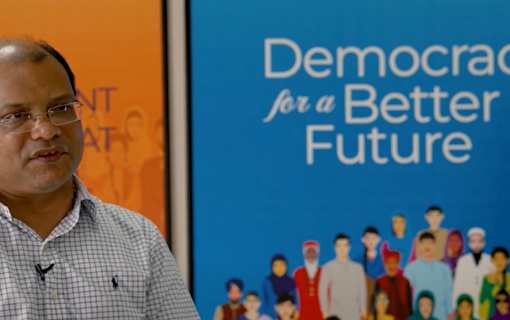Selecting a Model for Election Administration in Kosovo: Conclusions & Recommendations from Discussion Forum and Conference held on 1-2 and 16 February 2002
EXECUTIVE SUMMARY
Election administration in Kosovo is at a crossroads. After conducting two successful election processes, the Organization for Security and Co-operation in Europe (OSCE) indicated that the transfer of responsibility for the administration of elections in Kosovo from the international community to Kosovar institutions will be a priority in its planning for future elections.
It is important that future elections in Kosovo be conducted to the highest international standards of election administration. It is equally important that the systems put in place to manage elections be sustainable and acceptable to the people of Kosovo.
As first steps in the process of determining the structure of a future election administration system in Kosovo, the International Foundation for Election Systems (IFES) organized two events to explore this issue. The Election Administration Discussion Forum and Conference were funded by the United States Agency for International Development (USAID). The OSCE Department of Election Operations (DEO) provided logistical support.
To ensure wide representation of opinions, Kosovar participants from various fields with an interest in the process of election administration were invited to attend these events. Among the invitees were Central Election Commission (CEC) members, Municipal Election Commission (MEC) members, OSCE national election staff, and representatives from nongovernmental organizations (NGOs), political parties, the media, and academia.
The Discussion Forum took place in the Grand Hotel, Prishtin/PriStina on 1 and 2 February 2002. The aim of the Discussion Forum was to create the best opportunity for discussion among a smaller group of participants selected from the groups mentioned while the Conference served to present the deliberations of the Discussion Forum to a larger group of participants from the same groups and to discuss these issues further. The Discussion Forum was structured to facilitate informed debate on the issue at hand. Professor Rafael Lopez-Pintor, an internationally recognized expert on election administration, addressed the Discussion F O N ~to provide advice and information to participants. The discussions took place in both plenary session, and in smaller working groups. Dan Blessington, IFES Project Director in Macedonia, moderated plenary sessions while representatives from the National Democratic Institute (NDI) and the OSCE Department of Election Operations facilitated the working groups.
Although participants at the Discussion Forum reached broad consensus on many issues, such as the improvement in the performance of election staff on all levels, the need for an Election Management Body that is independent from the government of Kosovo, better voter education during the 2001 election, the pace of the handover to local officials, and the need for continued international oversight of election administration, the high level of discussion produced divergent opinions on the more detailed aspects of a future structure of election administration in Kosovo. Participants debated political party representation in election administration bodies, whether there should be at least one full-time MEC member, and the appropriate model for an election management structure. A report of the deliberations was prepared and presented at the Conference for further consideration of the issues.
The Conference, a one-day event held on 16 February 2002, was structured to facilitate presenting the report from the Discussion Forum and to explore the issues of consensus and debate further. In particular, the aim of the conference was to take a closer look at the more immediate decisions to be taken during the 2002 election process. At this event, which was again moderated by Dan Blessington, another expert on election administration, Gerald Mitchel1,Director of the Network of Europeans for Electoral and Democracy Support (NEEDS), was invited to present participants with his reflections on the need for integrity in election administration and the role election administration could play in democratizing societies. His presentation is presented in full in this report.
Rrahman Kastrati, MEC Secretary from Malisheve/MaliSevo, and CEC member Haxhi Rama presented the conclusions and recommendations from the Discussion Forum to the Conference. After considering this report, the Conference proceeded to discuss some of the immediate issues that should be addressed during the 2002 electoral process to facilitate effective handover of responsibilities for election administration to Kosovar institutions. The recommendations from this session are also included in the report.
Overall, this report attempts to reflect the areas of consensus as accurately as possible, and also to ensure that the opinions of those who differed are presented. In the spirit of the discussion, the participants expressed the hope that these opinions would be given serious consideration by decision-makers when the future of election administration in Kosovo is determined.
The conclusions reached and outstanding presented in this report reflect the need for Kosovar election administration institutions to be consolidated and institutionalized. The credibility of these institutions depends on the public's trust in their integrity. During the next few elections cycles, election administrators will be faced with increasing political pressures. It is essential that the MECs, CEC, and other election administrators have the support of the international community so that they may carry out their duties effectively while facing these pressures. It is essential to continued stability in Kosovo for these elections institutions to further develop their technical skills and maintain their credibility with voters, political parties, and all others involved in the electoral process.
Read the Full Report.









